Emerson Fittipaldi
 Fittipaldi in 2008 | |
| Born |
12 December 1946 São Paulo, Brazil |
|---|---|
| Formula One World Championship career | |
| Nationality |
|
| Active years | 1970–1980 |
| Teams | Lotus, McLaren, Fittipaldi Automotive |
| Entries | 149 (144 starts) |
| Championships | 2 (1972, 1974) |
| Wins | 14 |
| Podiums | 35 |
| Career points | 281 |
| Pole positions | 6 |
| Fastest laps | 6 |
| First entry | 1970 British Grand Prix |
| First win | 1970 United States Grand Prix |
| Last win | 1975 British Grand Prix |
| Last entry | 1980 United States Grand Prix |
Emerson Fittipaldi (Portuguese pronunciation: [ˈɛmeɾson fitʃiˈpawdʒi]; born December 12, 1946) is a semi-retired Brazilian automobile racing driver who won both the Formula One World Championship and the Indianapolis 500 twice each and the CART championship once.
Moving up from Formula Two, Fittipaldi made his race debut for Team Lotus as a third driver at the 1970 British Grand Prix. After Jochen Rindt was killed at the 1970 Italian Grand Prix, the Brazilian became Lotus' lead driver in only his fifth Grand Prix. He enjoyed considerable success with Lotus, winning the World Drivers' Championship in 1972 at the age of 25, a youngest F1 world champion record that he held for 33 years. He later moved to McLaren for 1974, winning the title once again. He surprised the paddock by moving to his brother's Fittipaldi Automotive team prior to the 1976 season, being replaced by James Hunt. Success eluded him during his final years in Formula One, with the Fittipaldi cars not competitive enough to fight for victories. Fittipaldi took two more podium finishes, before retiring in 1980.
Following his Formula One career, Fittipaldi moved to the American CART series, achieving successful results, including the 1989 CART title and two wins at the Indianapolis 500 (in 1989 and 1993, the final at an unprecedented 47 years old).
Since his retirement from Indy Car racing in 1996, Fittipaldi races only occasionally. At age 67, he entered the 2014 6 Hours of São Paulo.
Early and personal life
Emerson Fittipaldi was born in São Paulo, Brazil. He is the younger son of prominent Italian-Brazilian motorsports journalist and radio commentator Wilson Fittipaldi Sr[1] and his wife Józefa "Juzy" Wojciechowska, an immigrant from Saint Petersburg, Russia and of Polish and Russian descent. His grandfather Ivan Wojciechowski was an officer in the Tsarist army.[2][3] He was named after American author and philosopher, Ralph Waldo Emerson. Both his parents had raced production cars shortly after the Second World War and Wilson Sr was also responsible for the first Mil Milhas race in 1956, in São Paulo, having been inspired by the 1949 Italian Mille Miglia. Emerson became a motorsports enthusiast at an early age.
Fittipaldi is the younger brother of former Formula One driver and team owner Wilson Fittipaldi. He is the uncle of TUDOR United Sports Car Championship driver Christian Fittipaldi. He was married to Maria Helena from 1970 to 1982. They had three children together, Juliana, Jayson and Tatiana. He was married a second time, to Teresa, in the mid-1980s. They have one daughter, Joana, and a son, Luca. In early December 2012 he married economist Rossana Fanucchi in São Paulo after a partnership of eleven years. They have a son, Emerson, born in 2007, and daughter Vittoria, born in early 2012[4]
In his youth in Brazil, Emerson was known as 'Rato' - mouse, which contrasts with 'Tigrão' - big tiger - for his brother. By the end of his career he was most commonly known as 'Emmo' in the United States and the UK. In September 1997, while recovering from injuries in a crash at Michigan International Speedway a year earlier, Fittipaldi was flying his private plane across his orange tree farm in the state of São Paulo. The plane lost power and plunged 300 feet (91 m) to the ground, leaving hiim with serious back injuries. After recovering he became a born-again Christian.
He was a friend of Beatles guitarist George Harrison and was with him shortly before Harrison died in November 2001.[5]
Career history

At age 14, Fittipaldi was racing motorcycles, and at 16, hydrofoils. While racing one day, his brother Wilson took off at 70 mph (110 km/h) and landed upside down. Afterwards, they both decided that although he had survived, they would no longer race hydrofoils, and moved onto racing karts.[6]
The pair moved to racing Formula Vees, and built up a company with their parents. In his second season in single-seaters, Fittipaldi won the Brazilian Formula Vee title at age 21. He left for Europe in 1969, with the ambition to convince team owners of his talent in three months. After some podiums and his first victories in Formula Ford, Fittipaldi was first trained and then subsequently engaged by the Jim Russell Driving School Formula Three team. He won nine F3 races on the Jim Russell Lotus 59 in the MCD Lombard Championship to become the 1969 champion.
Formula Two
For 1970, Fittipaldi moved up to F2 by joining the Lotus semi-works Team Bardahl campaigning Lotus 59B. With six finishes in the points and four on the podium, he ended the eight-race season in third place behind Clay Regazzoni and Derek Bell. While this result was very impressive for the newcomer to the series, the spotlight was on Fittipaldi that year because of his activities in Formula One instead.
Formula One
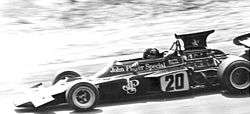

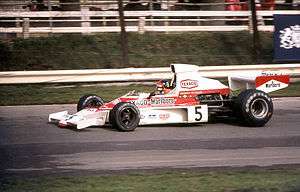

Based on the success of Cosworth DFV and Lotus 49/49B in 1968, Team Lotus was enjoying the reputation as one of the top F1 teams with the inflow of sponsorship money, and Colin Chapman used the third seat on the team for championship races as the testing ground for younger drivers. This was in contrast to the team's tradition to use non-championship F1 events for the purpose.
The third seat was given to Alex Soler-Roig in the early 1970, and then to Fittipaldi starting with the British GP in July, with Jochen Rindt and John Miles as the regular seat holders. Fittipaldi scored a fourth place as the No. 3 driver at the next German GP where the No. 1 Jochen Rindt won, and the No. 2 John Miles retired.
Team Lotus plans for the season drastically changed when Jochen Rindt was killed at Monza in September and became the only driver to win the championship posthumously. John Miles also left the team, and Fittipaldi was promoted to be the Lotus No. 1 driver on his fifth F1 race at the United States GP with Reine Wisell and Pete Lovely as the teammates. Fittipaldi proved up to the task and won this first post-Rindt race for Lotus.
In his first full year as Lotus' lead driver in 1971, Fittipaldi finished sixth in the drivers' championship as the team further developed the previous season's Lotus 72. Armed with what was arguably the greatest Formula one design of all time, the Lotus 72D, Fittipaldi proved dominant in 1972 as he won 5 of 11 races and easily won the F1 Drivers' Championship from Jackie Stewart by 16 points. At 25 he was then the youngest champion in F1 history. It appeared he might do it again in 1973. But after three wins in four attempts with the 72D, he began to struggle in the new 72E that was unveiled mid-year. It resulted in the reverse of the previous year, with Stewart beating Fittipaldi for the Drivers Championship by 16 points, though the combination of the 72D and E's points earnings were enough to gain Team Lotus the 1973 F1 Manufacturers Championship.
Fittipaldi left Lotus to sign with the promising McLaren team. Driving the highly efficient McLaren M23, he had three victories in 1974, reached the podium four other times, and beat out Clay Regazzoni in a close battle for his second championship. The following season, he notched two more victories and four other podiums, but was second to a dominant Niki Lauda. However, at the height of his F1 success, Fittipaldi shocked everyone by leaving McLaren to race for older brother Wilson Fittipaldi's Copersucar-sponsored Fittipaldi Automotive team.
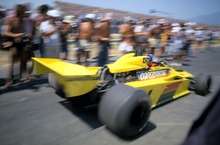
It was hardly a world-class organization and the double champion regularly struggled, failing to qualify in three races in his time there. Despite this, he remained with the team for five seasons but only managed a best finish of second. Emerson Fittipaldi decided to retire from racing at the end of 1980. He has since said that his last two years in Formula One were very unhappy: "I was too involved in the problems of trying to make the team work, and I neglected my marriage and my personal life",[7] although at the time he cited the deaths of many of his colleagues as his reason.[8] He was only 33, but had been racing in Formula One for a decade. He had failed to finish seven of the last ten races that year and had several times been outpaced by his Finnish teammate Keke Rosberg (a future champion himself). He moved into the management of the team[9] alongside his brother. The team struggled on for another two years with minimal sponsorship, going into receivership at the end of 1982.
CART
After leaving F1 in 1980, Fittipaldi took time out from major racing for four years, returning in 1984 in CART. The 38-year-old spent his first season acclimatising to IndyCars, driving for two teams before joining Patrick Racing as an injury replacement. He stayed five years with the team, recording six victories and solid finishes in the overall standings. In 1989 he had five wins and finished in the top five in every race he completed, giving him a CART championship. Among his wins was a dominant performance in the 1989 Indianapolis 500 where he led 158 of 200 laps and won by 2 laps, but only after a dramatic duel with Al Unser, Jr. in the closing laps of the race. With both drivers a commanding six laps ahead of third place Raul Boesel, Unser ran down Fittipaldi after a late-race restart and passed him for the lead on lap 196. Three laps later, Fittipaldi used lapped traffic to his advantage to pull alongside Unser on the backstretch. Neither driver would give way, and the two cars touched wheels as they went through turn three side by side. Unser's car spun out of control to hit the outside wall, while Fittipaldi was able to maintain sufficient control to keep his car moving straight. In spite of the altercation, Unser saluted Fittipaldi from the infield with a double thumbs-up sign as he brought his car through turns three and four on the subsequent caution-slowed final lap.
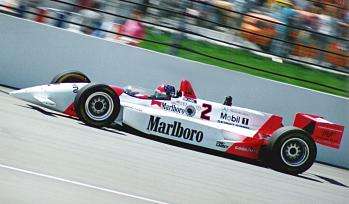
Roger Penske hired Fittipaldi for his racing team in 1990 and he continued to be among the top drivers in CART, winning at least one race with Penske for six straight years. In 1993 he added a second Indianapolis 500 victory by taking the lead from defending Formula One World Champion Nigel Mansell on lap 185 and holding it for the remainder. The race saw him break Indianapolis victory lane tradition when he drank a celebratory bottle of orange juice instead of the traditional bottle of milk. He was only the second driver to not drink milk at Indianapolis since the tradition was founded in 1936 (and firmly established in 1956). Fittipaldi owned several orange groves in his native Brazil, and wanted to promote the citrus industry. He was widely criticized and ridiculed for the action, even though he later took a sip of milk after the television cameras were off.
Fan reaction to the milk snub was highly negative, and he was booed a week later at Milwaukee. In the years that followed, many fans continued to hold the action against him. In interviews since, Fittipaldi explained his action, and apologised for the wave of negativity that followed. Fittipaldi returned to Indianapolis to drive the Chevrolet Corvette Pace Car for the 2008 Indianapolis 500. Despite coming clean, he was again booed and heckled by some fans during the Public Drivers' Meeting.
In May 1994, Fittipaldi skipped a practice session for the Indianapolis 500 after his close friend and fellow Brazilian world champion Ayrton Senna died during a Formula 1 crash. Fittipaldi was one of the pallbearers during Senna's funeral, alongside Jackie Stewart, Alain Prost and several other F1 world champions. Fittipaldi nearly won his third 500 race but clipped the turn 4 wall with 15 laps to go while he was holding a nearly full lap lead over teammate Unser Jr.
Approaching 50, he was still with Champ Car in 1996 when an injury at the Michigan International Speedway ended his career. Fittipaldi did not return to the series as a driver after the injury. Fittipaldi finished his Champ Car career with 22 wins. In 2003 he made a return to Champ Cars as a team owner.
Later career
Fittipaldi was the acting team principal for the Brazilian A1 GP entry.
In 2005 Fittipaldi made a surprise return to competitive racing in the Grand Prix Masters event held at Kyalami in South Africa, finishing second behind former CART sparring partner Nigel Mansell.
In 2008, Emerson and his brother Wilson entered the Brazilian GT3 Championship, driving a Porsche 997 GT3 for the WB Motorsports team.[10] In 2011, he started embracing social media by opening up an official Twitter and Facebook account, as well as becoming a Chairman of Motorsport.com.[11]
In 2013 he began writing a regular monthly blog column on the official website of McLaren.
Award
He was inducted in the Motorsports Hall of Fame of America in 2001.
Racing record
Complete Formula One World Championship results
(key) (Races in bold indicate pole position, races in italics indicate fastest lap)
Formula One non-championship results
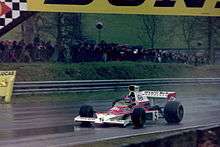
(key) (Races in bold indicate pole position) (Races in italics indicate fastest lap)
| Year | Entrant | Chassis | Engine | 1 | 2 | 3 | 4 | 5 | 6 | 7 | 8 |
|---|---|---|---|---|---|---|---|---|---|---|---|
| 1971 | Gold Leaf Team Lotus | Lotus 72 | Ford V8 | ARG Ret |
QUE Ret |
SPR 7 |
RIN | OUL | VIC 2 | ||
| Lotus 56B | P&W gas turbine | ROC Ret |
INT Ret |
||||||||
| 1972 | John Player Team Lotus | Lotus 72D | Ford V8 | ROC 1 |
BRA Ret |
INT 1 |
OUL 2 |
REP 1 |
VIC Ret |
||
| 1973 | John Player Team Lotus | Lotus 72 | Ford V8 | ROC Ret |
INT Ret |
||||||
| 1974 | Marlboro Team Texaco | McLaren M23 | Ford V8 | PRE 1 |
ROC 3 |
INT |
|||||
| 1975 | Marlboro Team McLaren | McLaren M23 | Ford V8 | ROC 5 |
INT 2 |
SUI Ret |
|||||
| 1978 | Fittipaldi Automotive | Fittipaldi F5A | Ford V8 | INT 2 |
|||||||
| 1980 | Skol Fittipaldi Team | Fittipaldi F7 | Ford V8 | ESP 5 |
USAC
(key) (Races in bold indicate pole position)
| Year | Team | 1 | 2 | Rank | Points |
|---|---|---|---|---|---|
| 1983-84 | GTS Racing | DQSF |
INDY 32 |
37th | 5 |
CART
(key) (Races in bold indicate pole position)
Indy 500 results

| Year | Chassis | Engine | Start | Finish | Team |
|---|---|---|---|---|---|
| 1984 | March | Cosworth | 23rd | 32nd | WIT |
| 1985 | March | Cosworth | 5th | 13th | Patrick |
| 1986 | March | Cosworth | 11th | 7th | Patrick |
| 1987 | March | Chevrolet | 33rd | 16th | Patrick |
| 1988 | March | Chevrolet | 8th | 2nd | Patrick |
| 1989 | Penske | Chevrolet | 3rd | 1st | Patrick |
| 1990 | Penske | Chevrolet | 1st | 3rd | Penske |
| 1991 | Penske | Chevrolet | 15th | 11th | Penske |
| 1992 | Penske | Chevrolet | 11th | 24th | Penske |
| 1993 | Penske | Chevrolet | 9th | 1st | Penske |
| 1994 | Penske | Ilmor-Mercedes | 3rd | 17th | Penske |
| 1995 | Lola | Ilmor-Mercedes | Failed to Qualify | Penske | |
Complete 24 Hours of Daytona results
| Year | Team | Co-Drivers | Car | Class | Laps | Pos. | Class Pos. |
|---|---|---|---|---|---|---|---|
| 1985 | |
|
March 85G-Buick | GTP | - | DNS | DNS |
Complete FIA World Endurance Championship results
| Year | Entrant | Class | Chassis | Engine | 1 | 2 | 3 | 4 | 5 | 6 | 7 | 8 | Rank | Points |
|---|---|---|---|---|---|---|---|---|---|---|---|---|---|---|
| 2014 | AF Corse | LMGTE Am | Ferrari 458 Italia GT2 | Ferrari 4.5 L V8 | SIL | SPA | LMS | COA | FUJ | SHA | BHR | SÃO 6 |
23rd | 8 |
* Season still in progress
See also
| Wikimedia Commons has media related to Emerson Fittipaldi. |
- Ayrton Senna and Nelson Piquet - Brazilian Formula One three time world champions
- Mario Andretti, Nigel Mansell and Jacques Villeneuve - Other Formula One and CART champions.
- Jim Clark, Graham Hill, Mario Andretti, and Jacques Villeneuve - Other Formula One and Indianapolis 500 champions.
- Jody Scheckter and Michael Schumacher - Other Formula One champions with brothers racing in the series.
References
- ↑ Comune di Trecchina. "Trecchina, un po' di storia". Retrieved 17 March 2016.
- ↑ "История Эмерсона Фиттипальди, рассказанная им самим" (in Russian). Archived from the original on March 15, 2014. Retrieved February 8, 2016.
- ↑ Ludvigsen (2002) p.26 Fittipaldi's paternal grandfather was Italian, and his maternal grandmother was Russian.
- ↑ "Emerson Fittipaldi oficializa união com Rossana Fanucchi em São Paulo". GloboEsporte. December 8, 2012. Retrieved February 8, 2016.
- ↑ "George Harrison in Brazil and Singing Tribute to Emerson Fittipaldi". Sounds and Colours. Retrieved February 8, 2016.
- ↑ "On the Move: Emerson Fittipaldi". Sunday Times. August 26, 2007.
- ↑ Ludvigsen, Karl (2002) 'Emerson Fittipaldi' p.136 Haynes Group. ISBN 1-85960-837-X
- ↑ Fittipaldi to Retire (December 12, 1980) The Times page 20
- ↑ "Emerson Fittipaldi". 8w.forix.com. Retrieved February 28, 2006.
- ↑ "Emerson Fittipaldi vai correr na GT3 Brasil". globo.com. Retrieved July 30, 2008.
- ↑ "Emerson Fittipaldi to Become Chairman of Motorsport.com, a Comprehensive Online Destination for the Motorsports World". The New York Times. August 16, 2011. Retrieved August 24, 2011.
- Books
Ludvigsen, Karl (2002). Emerson Fittipaldi Heart of a Racer. Osceola: Motorbooks International. ISBN 1-85960-837-X.
External links
- Official website
- Emerson Fittipaldi at the Internet Movie Database
- Emerson Fittipaldi career summary at DriverDB.com
- Emerson Fittipaldi driver statistics at Racing-Reference
- The Greatest 33
- Emerson embracing social media
